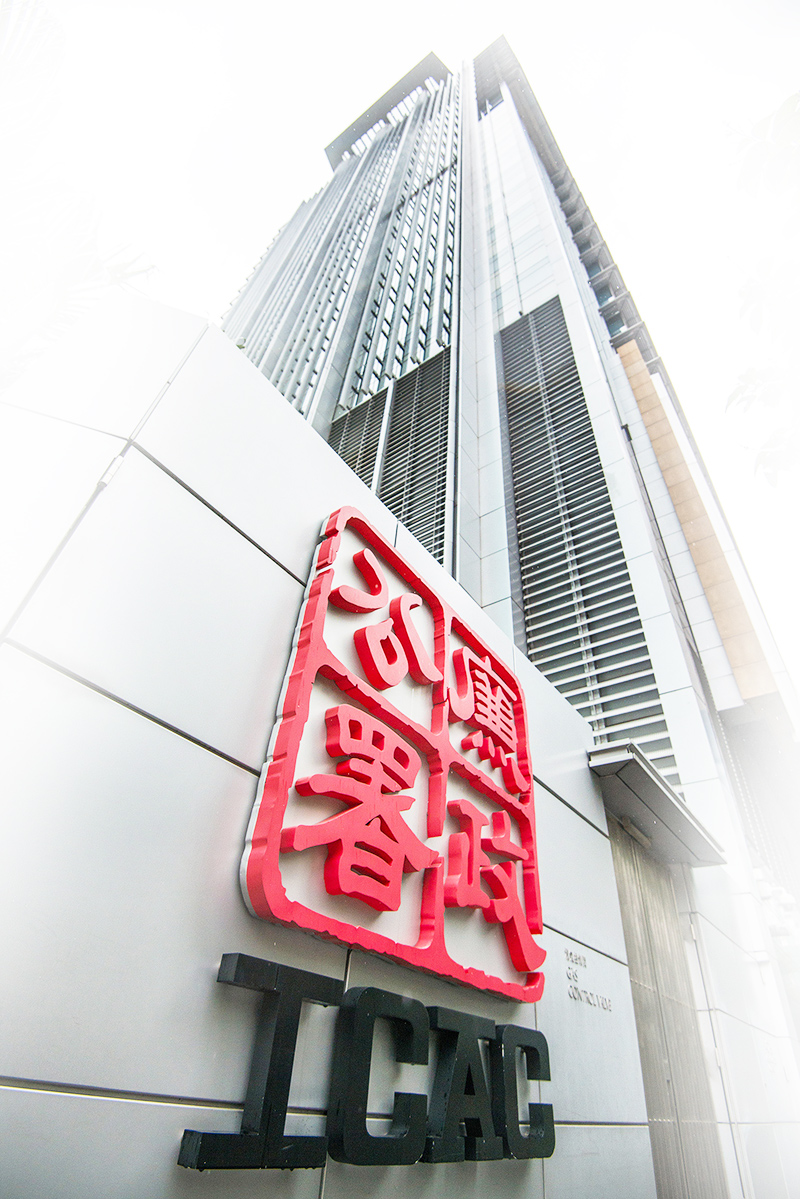Commissioner Online
Commissioner Online
Commissioner Online - Throwback 20 years A time for Changes, Responsiveness and Perseverance

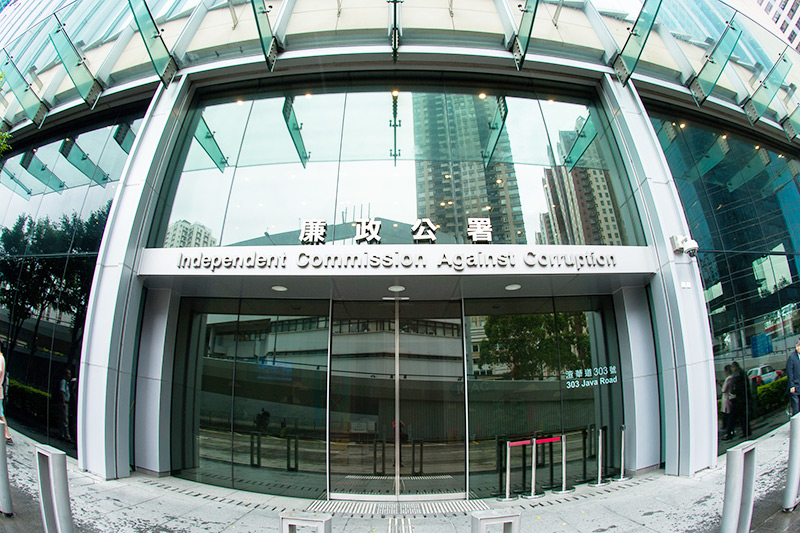
Two decades passed in a twinkling of an eye and this year marks the 20th anniversary of Hong Kong becoming a Special Administrative Region. As the new-term government is about to be sworn in, I am deeply honoured to be able to continue to serve Hong Kong as ICAC Commissioner.
Thanks to the hard work of all colleagues of the ICAC, the past five years saw some very encouraging development in its four departments. The many corruption cases and successful prosecutions involving both the government and the private sector bore testimony to the work of the Operations Department. In light of the corruption trend revealed in the complaints we received, the private sector has become a priority for the Corruption Prevention Department in providing preventive advice. On the education front, the Community Relations Department has been keeping a close tab on the social pulse and disseminating probity messages through new media platforms. In addition, a comprehensive review on the Commission Standing Order was conducted by the Administration Branch, our “gatekeeper”. Guidelines in relation to official entertainments, duty visits as well as gifts presented at official functions have been tightened. The ICAC has resumed good governance with the improved measures. While the next five years may bring new challenges, we will remain steadfast in our job. We will further enhance internal control and continue to safeguard Hong Kong as a corruption-free city.
The ICAC has come a long way in the anti-graft battle. Some media friends asked me how I would evaluate the Commission's work in the past 20 years. This is not an easy task. May be I can sum it up as follows: the anti-graft agency has sailed through two decades of changes, has always been responsive to public demands and yet remains constant in our determination and professionalism.
Some of you may recall that back at the time around the reunification, there were worries that corruption in Hong Kong might deteriorate. Back then there was a "quick buck syndrome" in our society. The temptation to cut corners had become less resistible to a handful of people. But the ICAC had been staunchly keeping its feet on the anti-graft front line through a three-pronged holistic strategy combining law enforcement, prevention and education. Hong Kong has remained a clean society after the reunification. Over the years, the Commission had introduced new measures to cope with social changes, and at the same time, continued to safeguard the city's core values of probity and integrity.
A time for Changes: Striving to enhance our capabilities and expertise
Technology advancement and globalisation brought rapid changes to our society. Corrupt practices have become more sophisticated and secretive. The modi operandi of criminals are increasingly complex and ever-changing. Nowadays criminals tend to conduct corrupt transactions through more indirect and intricate methods and their ill-gotten gains are well hidden, thus posing huge challenges to our investigative work in tracking the flow of bribes and corrupt activities. Meanwhile, integration of international financial markets and increasing mobility in international monetary transfers have facilitated dissipation of assets regardless of geographical boundaries, setting further hurdles to our investigative work.
To outsmart criminals, the ICAC has recognised that change is necessary. Only by continuously enhancing the Commission's capabilities and expertise could we prevent Hong Kong from backtracking to the bad old days of rampant corruption.
With this in mind, the Operations Department established the Computer Forensics Section in 1999 to provide support to frontline investigators in retrieving, securing and analysing electronic data for identifying valuable information for investigation. Over the years, the section has continuously upgraded its expertise to cope with increasing challenges.

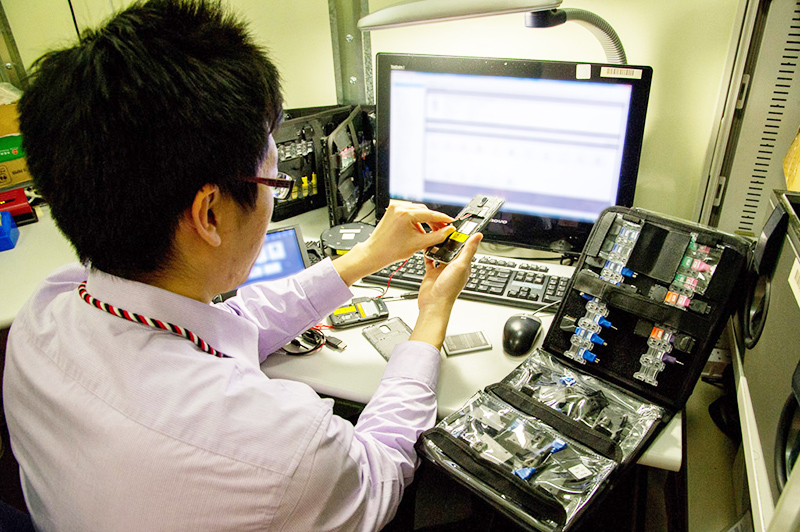
To deal with complex financial and commercial investigations, the Proceeds of Crime Section was established in 2010. The section is responsible for restraining, disclosing and confiscating assets in relation to corruption and related crimes, thus facilitating the ICAC's ability to deprive the corrupt of their crime proceeds and deal a heavy blow to criminal organisations.
The year 2011 saw the setting up of the Forensic Accounting Group under the Operations Department. Comprising dedicated forensic accountants, the group carries out investigations, conducts financial analysis and organises training courses for frontline investigators to equip them with the necessary skills and knowledge of financial investigations.
To tackle cross-boundary corruption and related crimes, the ICAC has taken a proactive approach in recent years by forging closer and stronger partnership with other jurisdictions. The ICAC also regularly organises international symposia and seminars for graft fighters from around the world to share their expertise and strategies in fighting corruption.
It is vital for law enforcers to remain at the forefront, review and refresh our investigative methods in order to bring the criminals to justice. The public can be rest assured that the ICAC will keep up with its highly professional work through continuous staff training.
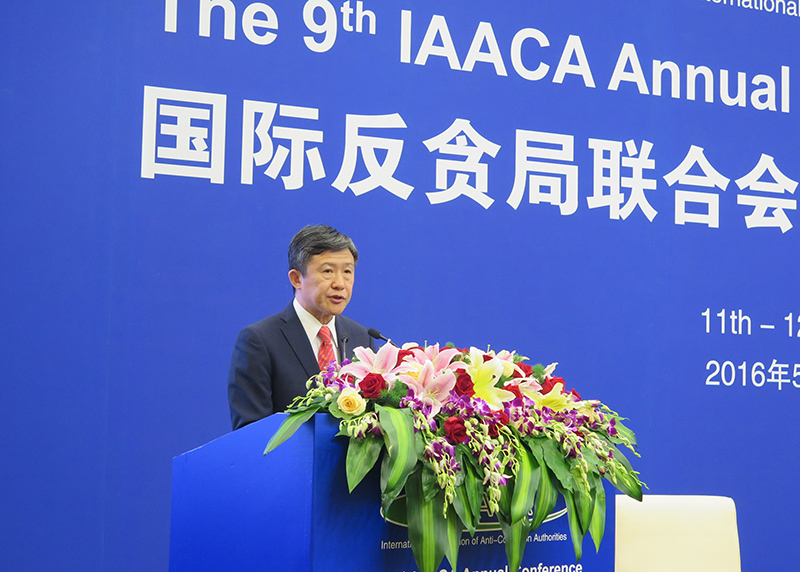

A time for Responsiveness: Meeting the needs of our society
Since the reunification, globalisation and booming economies in the vicinity have contributed to Hong Kong's further development into a global hub of finance, commerce, tourism and logistics. Of the corruption complaints received by the ICAC, the proportion of those concerning the private sector rose from about 50 per cent in 1997 to over 60 per cent in 2016. Ethical management and corporate governance have become a prime concern for the business sector and private organisations.
While syndicated corruption in government departments was eradicated, corruption in the private sector has become increasingly secretive and intricate. At the same time, members of the public want to be engaged. They treasure core values such as the rule of law, fairness, probity and integrity. They have high expectations for public officers and require them to be persons of integrity. They expect good governance from public bodies and public money to be properly spent. And they demand a more effective mechanism of checks and balances for law enforcement agencies and other government departments.

The Commission keeps refining its “three-pronged” strategy to cope with these social changes.
On the law enforcement front, the ICAC's first successful conviction for the common law offence of misconduct in public office in the early 2000s had raised the awareness of public officers. They recognised that they had to stay alert and uphold a high ethical standard and professionalism in order to maintain a clean civil service. The case also demonstrated that the ICAC's determination to root out corruption had never wavered.
The Commission has also stepped up liaison and cooperation with other law enforcement agencies and regulatory bodies to combat corruption and malpractices involving the business sector. Various programmes were launched to promote a high standard of corporate governance and ethical management and heighten business sector's alertness to corruption.
In 2000, the Elections (Corrupt and Illegal Conduct) Ordinance was enacted to replace the previous electoral law. The new legislation provides for a wider scope of application and more precise definitions in election matters, with the aim of facilitating the ICAC to keep public elections clean.
In addition, since the enactment of the Interception of Communications and Surveillance Ordinance in 2006, operational guidelines and working procedures have been devised and continuously improved to ensure strict compliance.

On the preventive front, since the reunification, the Corruption Prevention Department (CPD) has adopted a proactive and timely approach to provide preventive advice on issues impacting people's livelihood or those of public concerns. This has proved to be an effective means to plug corruption loopholes at an early stage.
To minimize corruption opportunities, the CPD very often would take the initiative to offer preventive advice to government departments in the course of formulating new policies or major infrastructure projects. Sample codes of conduct were produced and updated for government officers and employees of public bodies to alert them to the relevant best practices and probity requirements.
In recent years, the CPD has introduced a cross-sector strategy and partnership approach to enhance corruption prevention services for private organisations. Comprehensive corruption prevention mechanisms were established by partnering with different trades and industries as well as relevant government departments or public bodies. In addition, by keeping a close tab on social development, the CPD was able to provide practical preventive advice that met the needs of the public. Corruption prevention guidebooks and training packages were produced for different sectors, while special taskforces were set up to help different industries map out corruption prevention strategies.
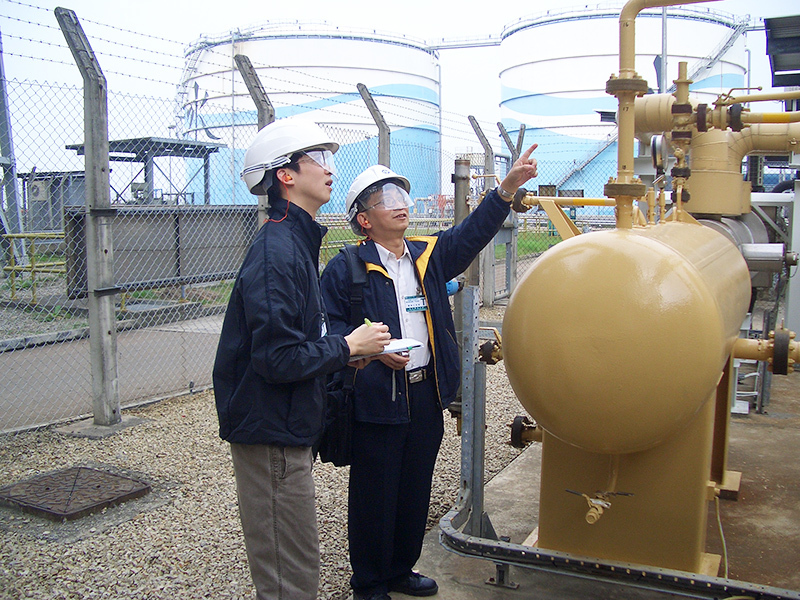
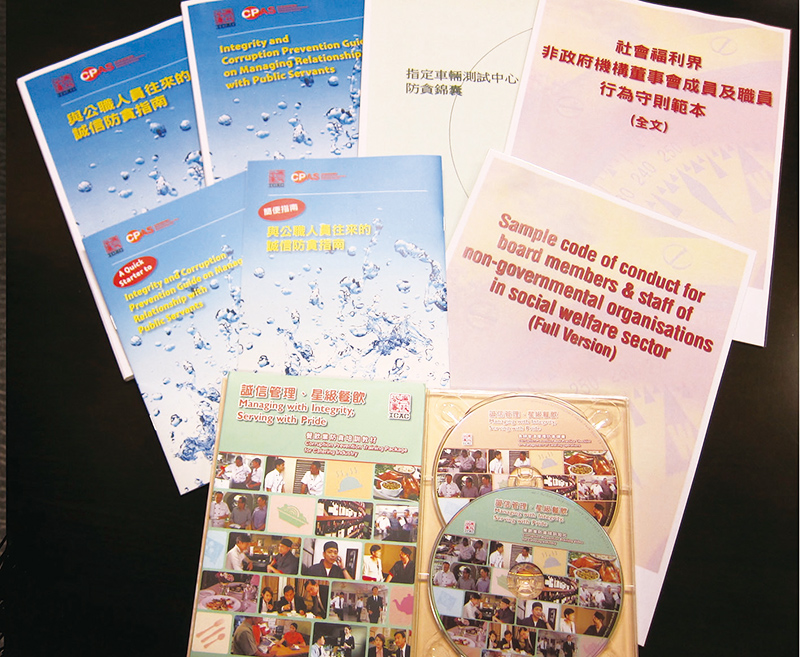
As regards education, the Community Relations Department (CRD) has always followed the social pulse closely. Multi-faceted activities are organised to spread anti-corruption messages to all walks of life and foster a probity culture.
The ICAC Club, a voluntary group set up in 1997, engages members of the public to help disseminate the anti-corruption messages in their local communities. Over the years, club members have become close allies and valuable partners of the ICAC in fostering the culture of probity.

A multi-year, territory-wide programme, entitled "All for Integrity", was launched last year, comprising an array of activities organised by the CRD. By consolidating community support for our anti-graft work and strengthening partnership with our stakeholders, we hope the anti-corruption messages will continue to reach the local communities in the long term.
Technology advancement has brought enormous changes to the modes of communications and people's daily lives. To effectively engage young people and draw their attention to the anti-corruption cause, the ICAC is making use of websites, multi-media productions and social media platforms like smartphone applications, Facebook and YouTube, to promote our work and messages.
The CRD attaches great importance to moral education of the young generations and introducing positive values to them at an early stage. Education kits featuring the cartoon rabbit Gee-Dor-Dor and other parenting programmes have been devised for small children. For secondary and tertiary students, the “iTeen Leadership” and “ICAC Ambassador” programmes have been in place to equip them for passing on the core value of probity and exuding a positive influence to the community by becoming ethical leaders in future. A Youth Chapter of the ICAC Club has also been launched this year to encourage more young people to contribute to the anti-corruption cause.


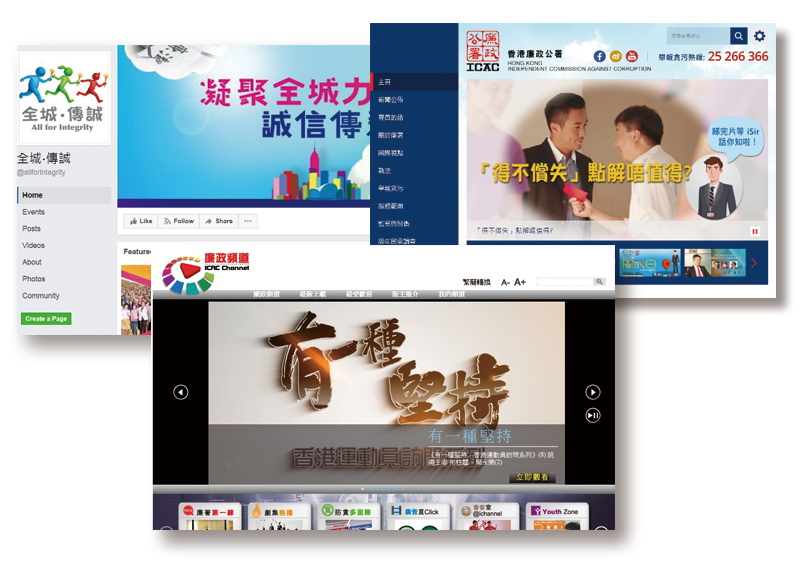
Last but not least, no review of the ICAC's achievements would be completed without mentioning the opening of the ICAC Building in 2007, which marked one of the milestones in the development of the Commission. For the first time in the ICAC's history, all departments of the Commission are housed in the same location. The ICAC Building provides comprehensive facilities that enable staff to work with greater efficiency. The building also represents the commitment of the government and the ICAC to maintaining Hong Kong as a world leader in the battle against corruption.
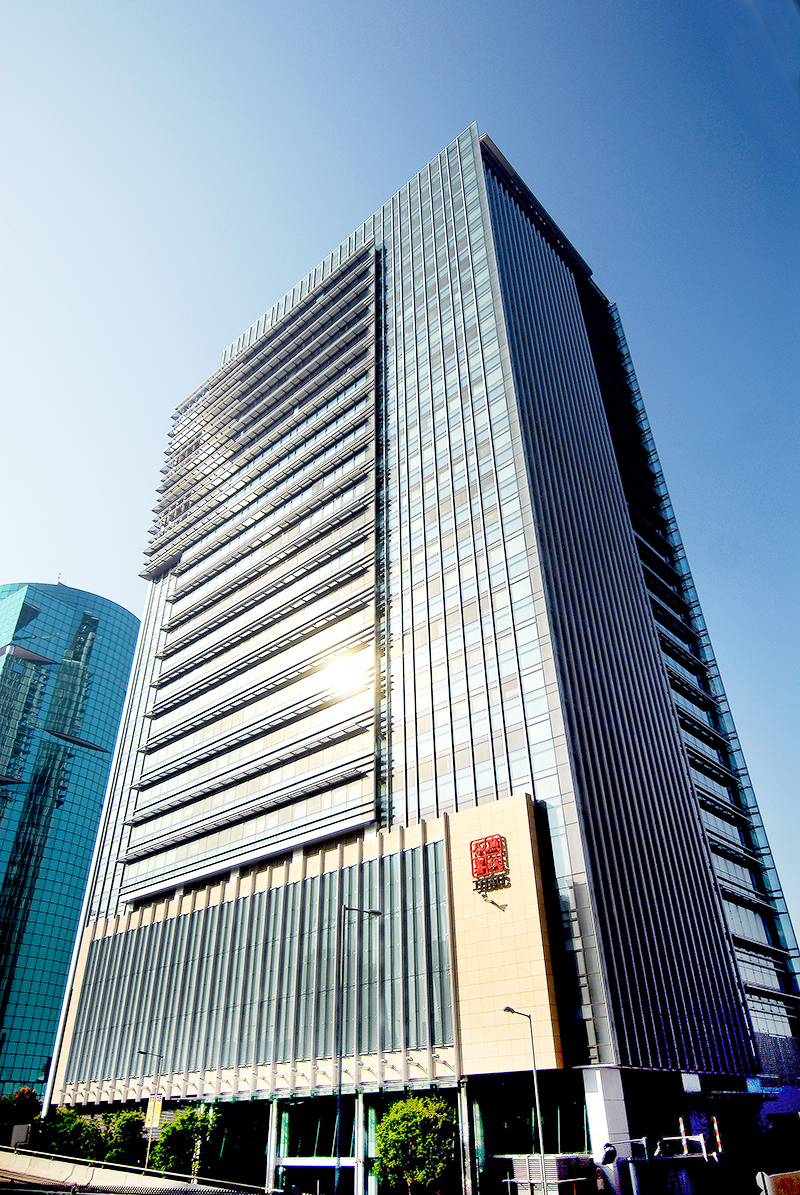
A time for Perseverance: Safeguarding a graft-free society with public support
Despite the many changes and adaptations the Commission made over the years in enhancing our work, one thing always remains unchanged – the ICAC's determination and commitment to combatting corruption and the professionalism our officers displayed in carrying out their duties.
Since the reunification, the ICAC had successfully smashed a number of major corruption cases, many of which attracted intense interest from the media and the public, such as cases involving cross-boundary corruption syndicates, bribery and misconduct in public office cases involving senior business executives, government officials and public officers, as well as graft cases concerning people's livelihood. These cases not only assert the ICAC's image as a pioneering graft fighter in the international arena, but also demonstrate the effectiveness of Hong Kong's anti-corruption regime – the ICAC is determined to fight corruption rigorously and impartially, and pursue all corruption cases in accordance with the law, regardless of the background, status and position of the persons involved.
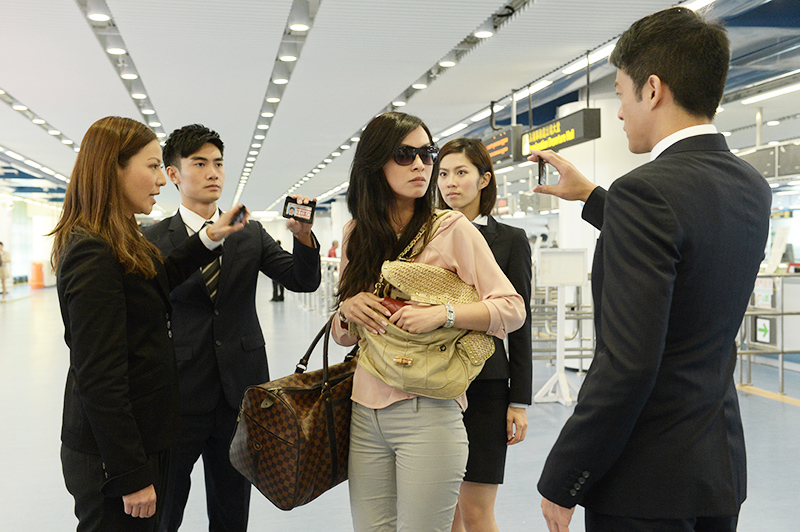
At the same time, with the concerted efforts of the Commission and the public, the culture of probity has firmly taken root in the society. According to some local surveys, members of the public considered integrity a core value they treasured most.
In recent years, results of the ICAC Annual Survey have consistently revealed that Hong Kong is a graft-free society and citizens are determined to eradicate corruption. For example, the 2016 ICAC Annual Survey revealed that only 1.2 per cent of respondents said they had encountered corruption in the past year, the lowest in recent years. The figure was on a par with that of Sweden, Finland and the Netherlands, which always topped the list as the cleanest places in the world in various surveys. The 2016 ICAC Annual Survey also found that 96.2 per cent of respondents said the ICAC deserved their support. Members of the public are indeed the ICAC's close partners in the fight against corruption and the strongest driving force for us.
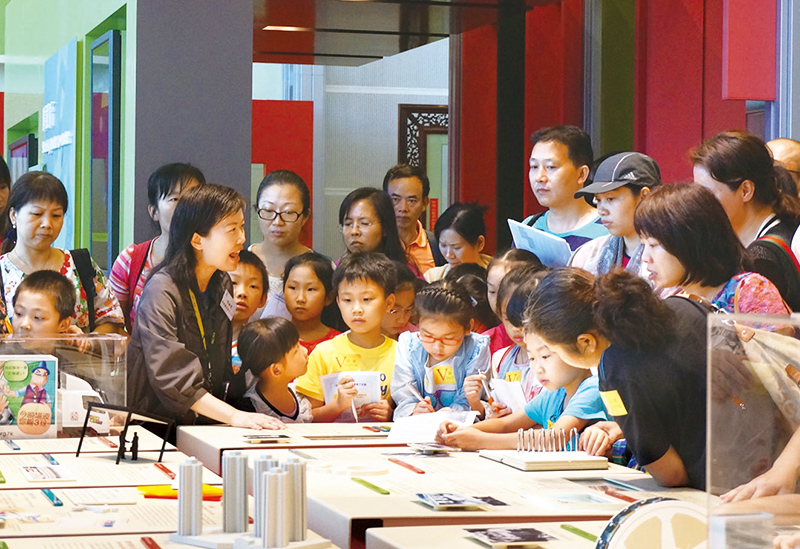
The public's willingness to report corruption, the ICAC's perseverance in robustly enforcing the law and the heavy penalties imposed by the court ensure that corruption in Hong Kong remains a high-risk crime.
The community and the ICAC each plays a role in the graft battle and time and again our efforts were recognised and affirmed by the international arena.
Hong Kong has been consistently ranked among one of the cleanest places in various international anti-corruption surveys. For example, in the annual Corruption Perceptions Index released by international anti-graft watchdog Transparency International (TI), Hong Kong had been ranked one of the top 20 least corrupt places over the past 20 years. Mr José Carlos Ugaz, Chair of TI, praised the ICAC for effectively combatting corruption and being a model for other countries. He was also deeply impressed by the Commission's holistic and effective three-pronged strategy against corruption, combining investigation, prevention and education.
The ICAC's anti-graft battle has been a hard one. There were times when the Commission became the focus of the media. But together with the community, we sailed through the storms and overcame many difficulties, while remaining resolute in discharging our anti-corruption duties in accordance with the law.
.jpg)
The ICAC is subject to close scrutiny from different strata of the community and we have always been receptive to criticisms and views from the public. In the past few years, the Commission has implemented various measures to further strengthen internal standing orders as well as relevant procedures and guidelines to meet the public's high expectation of the integrity of our staff.
The increasingly politicised and polarised society may have shaken some people's confidence in the ICAC. They may even doubt if the graft-buster has become a “political tool”. I can assure the people of Hong Kong that the ICAC is still the same ICAC. All along the Commission has been discharging its anti-graft duties professionally, impartially and without interference. And we will continue to do so.
Speculations, misunderstandings and rumours about the ICAC's internal affairs in recent years had inevitably harmed the Commission's reputation. Our senior management, including all department heads and myself, had on many occasions offered explanations to staff and the public in order to eliminate unnecessary worries. Members of the public can be rest assured that our colleagues remain as committed as ever in their anti-graft mission. There is no interference in their job and their determination had not been beaten in any way.
ICAC's pledge: Overcoming challenges ahead for a society of probity
Probity is among the key pillars that lay the foundation of Hong Kong, our home. Let us not forget that people from some other countries are still subject to suffering because of corruption. Let us not forget to treasure the achievement Hong Kong people and the ICAC together have made in the past 40 years. It is the ICAC's pledge to keep on fighting for the anti-corruption cause and maintain Hong Kong's competitive edge, regardless of the difficulties and challenges that lie ahead. And we hope members of the public will continue to render their whole-hearted support.

ICAC Commissioner
